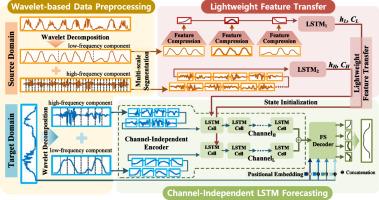LFTL: Lightweight feature transfer learning with channel-independent LSTM for distributed PV forecasting
IF 9.6
Q1 COMPUTER SCIENCE, ARTIFICIAL INTELLIGENCE
引用次数: 0
Abstract
Distributed photovoltaic (PV) power forecasting in newly installed systems faces challenges due to inherent stochastic volatilities and limited historical data. This paper proposes a lightweight feature transfer learning (LFTL) method that enables rapid and accurate forecasting of new distributed PVs. Firstly, the raw fluctuating PV data are preprocessed through decomposition to separate low- and high-frequency components. These components are then multi-scale segmented to capture diverse temporal characteristics. Following feature compression and LSTM temporal modeling, the informative features from the source domain enable lightweight transfer. For the target domain, a channel-independent encoder is designed to prevent negative interactions between heterogeneous frequencies. The frequency-fused segment-independent decoder equipped with positional embeddings enables local temporal analysis and reduces error accumulation of multi-step forecasts. LFTL trains with a joint training strategy to avoid negative transfer caused by domain disparity. LFTL consistently outperforms state-of-the-art time-series forecast models while maintaining a relatively low computational overhead based on real-world distributed PV data.

LFTL:基于信道独立LSTM的轻量级特征迁移学习,用于分布式PV预测
分布式光伏发电系统的功率预测由于其固有的随机波动性和有限的历史数据而面临挑战。本文提出了一种轻量级特征迁移学习(LFTL)方法,能够快速准确地预测新的分布式pv。首先,对原始波动PV数据进行分解预处理,分离出低频和高频分量;然后对这些组件进行多尺度分割,以捕获不同的时间特征。在特征压缩和LSTM时态建模之后,来自源域的信息特征支持轻量级传输。对于目标域,设计了信道无关的编码器,以防止异构频率之间的负相互作用。配备位置嵌入的频率融合段独立解码器能够进行局部时间分析,并减少多步预测的误差积累。LFTL训练采用联合训练策略,避免了域差异带来的负迁移。LFTL始终优于最先进的时间序列预测模型,同时保持相对较低的基于实际分布式PV数据的计算开销。
本文章由计算机程序翻译,如有差异,请以英文原文为准。
求助全文
约1分钟内获得全文
求助全文
来源期刊

Energy and AI
Engineering-Engineering (miscellaneous)
CiteScore
16.50
自引率
0.00%
发文量
64
审稿时长
56 days
 求助内容:
求助内容: 应助结果提醒方式:
应助结果提醒方式:


